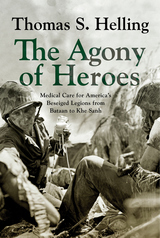285 start with C start with C
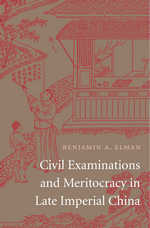
During China's late imperial period (roughly 1400-1900 CE), men would gather by the millions every two or three years outside official examination compounds sprinkled across China. Only one percent of candidates would complete the academic regimen that would earn them a post in the administrative bureaucracy. Civil Examinations assesses the role of education, examination, and China's civil service in fostering the world's first professional class based on demonstrated knowledge and skill.
While millions of men dreamed of the worldly advancement an imperial education promised, many more wondered what went on inside the prestigious walled-off examination compounds. As Benjamin A. Elman reveals, what occurred was the weaving of a complex social web. Civil examinations had been instituted in China as early as the seventh century CE, but in the Ming and Qing eras they were the nexus linking the intellectual, political, and economic life of imperial China. Local elites and members of the court sought to influence how the government regulated the classical curriculum and selected civil officials. As a guarantor of educational merit, civil examinations served to tie the dynasty to the privileged gentry and literati classes--both ideologically and institutionally.
China did away with its classical examination system in 1905. But this carefully balanced and constantly contested piece of social engineering, worked out over the course of centuries, was an early harbinger of the meritocratic regime of college boards and other entrance exams that undergirds higher education in much of the world today.
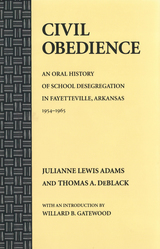
While school desegregation generated much noise and some violence elsewhere in the South, the city of Fayetteville, Arkansas confronted the issue and resolved it with a good deal of dignity and grace, becoming the first Southern city to accommodate the Brown decision.
Through this fascinating collection of interviews with those who were involved in the desegregation process—students, teachers, administrators, civic leaders, and members of local groups—we learn of the determination of citizens to obey the law of the land and to see that freedom and equality took priority over their commitment to a school system that patently discriminated against one group of citizens.
In our continuing efforts to create a society in which all races and cultures can coexist, Civil Obedience is a story worthy of our full attention.
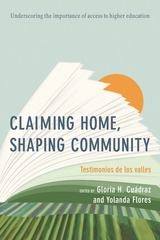
While symbolically their journeys embody the master narrative of the “American Dream,” Claiming Home, Shaping Community does not echo the “rags to riches” trope reified in dominant culture, but rather, it asserts the need to rehumanize the purpose and heart of education. In each chapter, the narrators illustrate myriad supports that allowed them to move forward on their academic and professional journeys: hard work, affirmative action, inclusionary practices, mentors, and their communities’ cultural wealth. Each trajectory is unique, but put together as a collection, the commonalities emerge.
Denoting a sense of political and social urgency that responds to the current accentuated economic disparities between the haves and the have-nots, these essays illuminate the broader societal benefits of federal legislation and resources for state-funded public higher education and policies that broaden access and resources. By telling their stories, the contributors seek to empower others on their journeys to and through higher education.
Contributors:
Daniel “Nane” Alejandrez
Manuel Barajas
Angelica Cárdenas-Chaisson
Gloria H. Cuádraz
Yolanda Flores
Francisco J. Galarte
John J. Halcón
Ester Hernández
Rosa M. Jiménez
Roberto Moreno
José R. Padilla
Enid Pérez
Caroline Sotello Viernes Turner
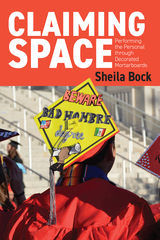
Claiming the space of these graduation caps is a popular and widespread way that individuals make their voices heard, or rather seen, in the visual landscape of commencement ceremonies. The forms and meanings of these material displays take shape in relation to broader, ongoing conversations about higher education in the United States, conversations grounded in discourses of belonging, citizenship, and the promises of the American Dream. Integrating observational fieldwork with extensive interviews and surveys, author Sheila Bock highlights the interpretations of individuals participating in this tradition. She also attends to the public framings of this tradition, including how images of mortarboards have grounded online enactments of community through hashtags such as #LatinxGradCaps and #LetTheFeathersFly, as well as what rhetorical framings are employed in news coverage and legal documents in cases where the value of the practice is both called into question and justified.
As university administrators and cultural commentators seek to make sense of the current state of higher education, these forms of material expression offer insight into how students themselves are grappling with higher ed's promises and shortcomings. Claiming Space is a meaningful contribution to folklore, cultural studies, media studies, and education.
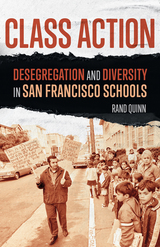
A compelling history of school desegregation and activism in San Francisco
The picture of school desegregation in the United States is often painted with broad strokes of generalization and insulated anecdotes. Its true history, however, is remarkably wide ranging. Class Action tells the story of San Francisco’s long struggle over school desegregation in the wake of the 1954 U.S. Supreme Court decision Brown v. Board of Education.
San Francisco’s story provides a critical chapter in the history of American school discrimination and the complicated racial politics that emerged. It was among the first large cities outside the South to face court-ordered desegregation following the Brown rulings, and it experienced the same demographic shifts that transformed other cities throughout the urban West. Rand Quinn argues that the district’s student assignment policies—including busing and other desegregative mechanisms—began as a remedy for state discrimination but transformed into a tool intended to create diversity. Drawing on extensive archival research—from court docket files to school district records—Quinn describes how this transformation was facilitated by the rise of school choice, persistent demand for neighborhood schools, evolving social and legal landscapes, and local community advocacy and activism.
Class Action is the first book to present a comprehensive political history of post-Brown school desegregation in San Francisco. Quinn illuminates the evolving relationship between jurisprudence and community-based activism and brings a deeper understanding to the multiracial politics of urban education reform. He responds to recent calls by scholars to address the connections between ideas and policy change and ultimately provides a fascinating look at race and educational opportunity, school choice, and neighborhood schools in the aftermath of Brown v. Board of Education.
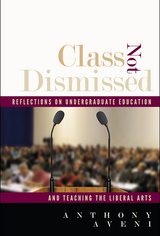
Although in recent years the lecture has come under fire as a pedagogical method, Aveni ardently defends lecturing to students. He shares his secrets on crafting an engaging lecture and creating productive dialogue in class discussions. He lays out his rules on classroom discipline and tells how he promotes the lost art of listening. He is a passionate proponent of the liberal arts and core course requirements as well as a believer in sound teaching promoted by active scholarship.
Aveni is known to his students as a consummate storyteller. In Class Not Dismissed he shares real stories about everyday college life that shed light on serious educational issues. The result is a humorous, reflective, inviting, and powerful inquiry into higher education that will be of interest to anyone invested in the current and future state of college and university education.
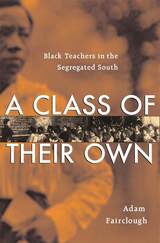
In this major undertaking, civil rights historian Adam Fairclough chronicles the odyssey of black teachers in the South from emancipation in 1865 to integration one hundred years later. No book until now has provided us with the full story of what African American teachers tried, achieved, and failed to do in educating the Southern black population over this critical century.
This magisterial narrative offers a bold new vision of black teachers, built from the stories of real men and women, from teachers in one-room shacks to professors in red brick universities. Fairclough explores how teachers inspired and motivated generations of children, instilling values and knowledge that nourished racial pride and a desire for equality. At the same time, he shows that they were not just educators, but also missionaries, politicians, community leaders, and racial diplomats. Black teachers had to negotiate constantly between the white authorities who held the purse strings and the black community’s grassroots resistance to segregated standards and white power. Teachers were part of, but also apart from, the larger black population. Often ignored, and occasionally lambasted, by both whites and blacks, teachers were tireless foot soldiers in the long civil rights struggle.
Despite impossible odds—discrimination, neglect, sometimes violence—black teachers engaged in a persistent and ultimately heroic struggle to make education a means of liberation. A Class of Their Own is indispensable for understanding how blacks and whites interacted and coexisted after the abolition of slavery, and how black communities developed and coped with the challenges of freedom and oppression.
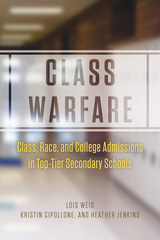
Drawing on deep and sustained contact with students, parents, teachers, and administrators at three iconic secondary schools in the United States, the authors unveil a formidable process of class positioning at the heart of the college admissions process. They detail the ways students and parents exploit every opportunity and employ every bit of cultural, social, and economic capital they can in order to gain admission into a “Most Competitive” or “Highly Competitive Plus” university. Moreover, they show how admissions into these schools—with their attendant rankings—are used to lock in or improve class standing for the next generation. It’s a story of class warfare within a given class, the substrata of which—whether economically, racially, or socially determined—are fiercely negotiated through the college admissions process.
In a historic moment marked by deep economic uncertainty, anxieties over socioeconomic standing are at their highest. Class, as this book shows, must be won, and the collateral damage of this aggressive pursuit may just be education itself, flattened into a mere victory banner.

The specific challenge that confronted Count Dmitry Tolstoi as Minister of Education was to raise the educational level of the Russian people without giving them the intellectual weapons with which to threaten the autocracy. The efforts of Tolstoi's ministry to resolve this dilemma resulted in comprehensive reforms which shaped the Russian school system until early in the twentieth century.
It is interesting therefore that, until now, there has been no complete analysis of all aspects of Tolstoi's ministry. Allen Sinel's study fills that gap.
Beginning with the historical, political, biographical, and administrative contexts for Tolstoi's reforms, Sinel then provides a detailed examination of Tolstoi's transformation of Russian education at all levels, particularly the secondary level, which was the cornerstone of his program.
The ministry's greatest achievement in improving the school system was increasing the number of schools and supplying trained teachers to staff them. Less successful were Tolstoi's efforts to minimize the political consciousness of the students. Tolstoi's methods were short-sighted and negative, helping to create the very elements of alienation and antagonism that might destroy the existing regime he wanted so much to protect and preserve.
Sinel's analysis of Tolstoi's program, the most durable of the tsarist period, provides a much-needed survey of the Russian educational system at a crucial time in Russian history. In addition, the study contributes to a more balanced assessment of one of tsardom's most important bureaucrats.
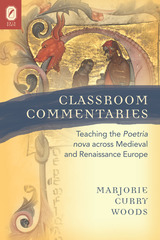
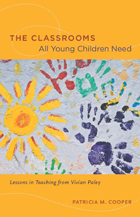
Teacher and author Vivian Paley is highly regarded by parents, educators, and other professionals for her original insights into such seemingly everyday issues as play, story, gender, and how young children think. In The Classrooms All Young Children Need, Patricia M. Cooper takes a synoptic view of Paley’s many books and articles, charting the evolution of Paley’s thinking while revealing the seminal characteristics of her teaching philosophy. This careful analysis leads Cooper to identify a pedagogical model organized around two complementary principles: a curriculum that promotes play and imagination, and the idea of classrooms as fair places where young children of every color, ability, and disposition are welcome.
With timely attention paid to debates about the reduction in time for play in the early childhood classroom, the role of race in education, and No Child Left Behind, The Classrooms All Young Children Need will be embraced by anyone tasked with teaching our youngest pupils.
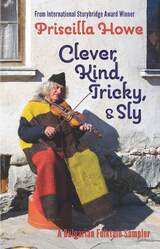
Each folktale expresses an aspect of Bulgarian folk culture, presents characters who are clever enough to avoid ill-conceived courtship, kind enough to esteem even the poorest of neighbors, tricky enough to evade shysters, or sly enough to remain independent in the face of great power. Each of these traits has helped the Bulgarian people survive and thrive in a relatively poor, mountainous environment for more than fourteen centuries. In celebrating these traits and others, the folktales collected here honor the character of a people.
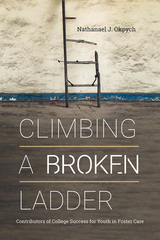
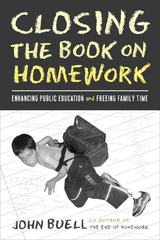
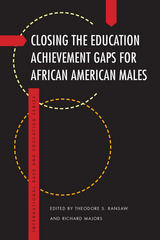
The distinguished and expert contributors whose work comprises this volume include an achievement-gap specialist for males of color, two psychologists, a math teacher, an electrical engineer, a former school principal, a social worker, and a former human rights commissioner. From black male learning styles to STEM, this book shows that issues pertaining to educational outcomes for black males are nuanced and complex but not unsolvable.
With its combination of fresh new approaches to closing achievement gaps and up-to-date views on trends, this volume is an invaluable resource on vital contemporary social and educational issues that aims to improve learning, equity, and access for African American males.
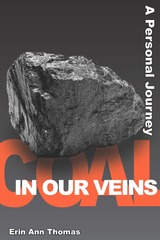
In Coal in Our Veins, Erin Thomas employs historical research, autobiography, and journalism to intertwine the history of coal, her ancestors' lives mining coal, and the societal and environmental impacts of the United States' dependency on coal as an energy source. In the first part of her book, she visits Wales, native ground of British coal mining and of her emigrant ancestors. The Thomases' move to the coal region of Utah—where they witnessed the Winter Quarters and Castle Gate mine explosions, two of the worst mining disasters in American history—and the history of coal development in Utah form the second part.
Then Thomas investigates coal mining and communities in West Virginia, near her East Coast home, looking at the Sago Mine collapse and more widespread impacts of mining, including population displacement, mountain top removal, coal dust dispersal, and stream pollution, flooding, and decimation. The book's final part moves from Washington D.C.—and an examination of coal, CO2, and national energy policy—back to Utah, for a tour of a coal mine, and a consideration of the Crandall Canyon mine cave-in, back to Wales and the closing of the oldest operating deep mine in the world and then to a look at energy alternatives, especially wind power, in West Virginia and Pennsylvania.
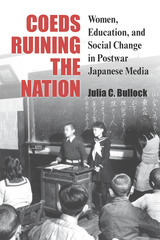
This is the first book in English to explore the arguments for and against coeducation as presented in newspaper and magazine articles, cartoons, student-authored school newsletters, and roundtable discussions published in the Japanese press as these reforms were being implemented. It complicates the notion of the postwar years as a moment of rupture, highlighting prewar experiments with coeducation that belied objections that the practice was a foreign imposition and therefore “unnatural” for Japanese culture. It also illustrates a remarkable degree of continuity between prewar and postwar models of femininity, arguing that Occupation-era guarantees of equal educational opportunity were ultimately repurposed toward a gendered division of labor that underwrote the postwar project of economic recovery. Finally, it excavates discourses of gender and sexuality underlying the moral panic surrounding coeducation to demonstrate that claims of rampant sexual deviance and other concerns were employed as disciplinary mechanisms to reinforce an ideology of harmonious gender complementarity and to dissuade women from pursuing conventionally masculine prerogatives.
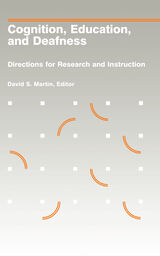

"A most stimulating, and intellectually delightful book."—John Goldsmith
"[De Mey] has brought together an unusually wide range of material, and suggested some interesting lines of thought, about what should be an important application of cognitive science: The understanding of science itself."—Cognition and Brain Theory
"It ought to be on the shelf of every teacher and researcher in the field and on the reading list of any student or practitioner seriously interested in how those they serve are likely to set about knowing."—ISIS
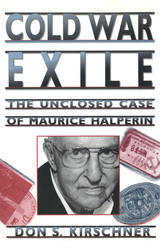
In 1953 Maurice Halperin was called before the Senate Internal Security Subcommittee to defend himself on charges of espionage. He was accused of having supplied Soviet sources with classified material from the Office of Strategic Services while he was an employee during World War II.
The Cold War was in full force. McCarthyism was at its peak. Caught up in the rapids of history, Maurice Halperin's life spun out of control. Denying the charges but knowing he could never fully clear his name, Halperin fled to Mexico and then, to avoid extradition, to Moscow. Among the friends he made there were British spy Donald MacLean and Cuban revolutionary leader Che Guevara. Disenchanted with socialism in the Soviet Union, he accepted Guevara's invitation to come to Havana in 1962. There he worked for Castro's government for five years before political tension forced him to leave for Vancouver, Canada, where he now resides.
Was Halperin a spy or a scapegoat? Was he a victim of Red- baiting or a onetime Communist espionage agent who eventually lost faith in Communism? Halperin's accuser was Elizabeth Bentley, a confessed Soviet courier who accused more than one hundred Americans of spying. Yet Bentley had no proof, and Halperin continues to maintain his innocence. One of them was lying. As Kirschner unravels the engrossing facts of the case--utilizing FBI files and dozens of interviews, including extensive interviews with Halperin himself--the reader becomes the investigator in a riveting real-life spy mystery. Along the way Kirschner offers new material on the OSS and further disturbing information about J. Edgar Hoover's use of his considerable power.
Maurice Halperin has lived a life like few Americans in our century. A left-wing American exile, he experienced two socialist worlds from the inside. In recounting the unclosed case of Maurice Halperin, Cold War Exile is both a gripping account of that remarkable life and a significant contribution to our understanding of a fascinating and controversial era in American political history.
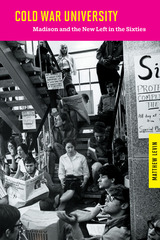
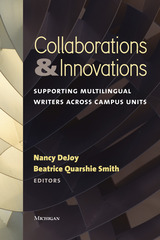
The chapters in this volume demonstrate that teaching effective communication skills to all students in ways that recognize the needs of multiple language users requires a shift in perspective that approaches multilingualism as an opportunity that is enhanced by the internationalization of higher education because it makes transparent the problems of current structures and disciplinary approaches in accessing those opportunities. A goal of this collection is to address the economic, structural, disciplinary, and pedagogical challenges of making this type of shift in bold and compassionate ways.
Chapters are organized into these four parts--Program-Level Challenges and Opportunities, Opportunities for Enhancing Teacher Training, Multilingualism and the Revision of First-Year Writing, and Integrating Writing Center Insights—and reflect the perspectives of a variety of university language settings. The contributions feature collaborative models and illustrate the need to rethink structures, pedagogies, assessment/evaluation processes, and teacher training for graduate and undergraduate students who will teach writing and other forms of communication.
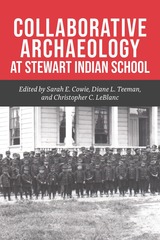
This edited volume addresses the theory, methods, and outcomes of collaborative archaeology conducted at the Stewart Indian School site and is a genuine collective effort between archaeologists, former students of the school, and other tribal members. With more than twenty contributing authors from the University of Nevada, Reno, Nevada Indian Commission, Washoe Tribal Historic Preservation Office, and members of Washoe, Paiute, and Shoshone tribes, this rich case study is strongly influenced by previous work in collaborative and Indigenous archaeologies. It elaborates on those efforts by applying concepts of governmentality (legal instruments and practices that constrain and enable decisions, in this case, regarding the management of historical populations and modern heritage resources) as well as social capital (valued relations with others, in this case, between Native and non-Native stakeholders).
As told through the trials, errors, shared experiences, sobering memories, and stunning accomplishments of a group of students, archaeologists, and tribal members, this rare gem humanizes archaeological method and theory and bolsters collaborative archaeological research.
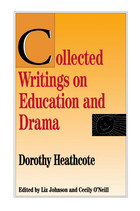
In this lively collection of essays and talks from 1967-80, Heathcote shares the findings of her groundbreaking work in the application of theater techniques and play to classroom teaching. She provides a time-tested philosophy on the value of dramatic activity in breaking down barriers and overcoming inertia. Her insistence that teachers must step down from their pedestals and immerse themselves in the possibility of the moment makes for magical and challenging reading.
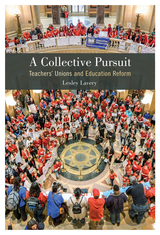
Teachers’ unions are the organizations responsible for safeguarding the conditions of teachers’ employment. Union supporters claim strong synergies between teachers’ interests and students’ interests, but critics of unions insist that the stance of teachers in collective bargaining may disadvantage students as unions reduce the power of administrators to manage, remove, reward or retain excellent teachers.
In A Collective Pursuit, Lesley Laveryunpacks how teachers’ unions today are fighting for contracts that allow them to earn a decent living and build “schools all students deserve.” She explains the form and function of the nation’s largest teachers’ unions. Lavery then explores unionization campaigns in the Twin Cities charter schools. A Collective Pursuit also examines teacher strikes and contract negotiations, school finance and finance reform, and district and union attempts to address racial achievement gaps, to provide a context for understanding the economic, political, and demographic forces that inspire teachers to improve conditions for students.
A Collective Pursuit emphasizes that while teachers’ unions serve a traditional, economic role, they also provide a vast array of valuable services to students, educators, parents, and community members.

Late one afternoon, as you are organizing your new office as department chair, one of the senior members of the department drops by. He affably informs you of his plans for the coming semester: that contrary to the published class schedule, he only teaches on Tuesday afternoon, Wednesday, and Thursday morning, so as to have the weekends free for travel; that he expects the office staff to start his coffeemaker by 10 a.m. sharp on his teaching days; and that since he hasn’t been assigned a research assistant, his teaching assistant will do research tasks, including errands. What do you say? What do you do?
Never mind budgets or curriculum reform: staff problems can be the most thorny of any academic administrator’s job. Every day, professors who have never run anything bigger than a seminar find themselves in charge of a complex and volatile organization called a Department of English (or Biology, or Sociology, or Textile Marketing). What should they do?
In this book, a widely respected advisor on academic administration and ethics offers tips, insights, and tools on handling complaints, negotiating disagreements, responding to accusations of misconduct, and dealing with difficult personalities. With humor and generosity, C. K. Gunsalus applies scenarios based on real-life cases, examples from negotiation, law, and child-rearing to guide novice (and experienced) academic administrators through the dilemmas of management in not-entirely-manageable environments.
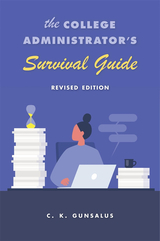
The book that every dean and department chair needs to survive—and thrive—in the twenty-first-century university.
First released in 2006, The College Administrator’s Survival Guide has served as the bible for a generation of provosts, deans, department chairs, and program directors. Shrewd administrators have returned to the guide time and again for C. K. Gunsalus’s advice on handling complaints, negotiating disagreements, and dealing with difficult personalities. Now, in this revised and updated edition, Gunsalus guides rookie administrators and seasoned veterans through today’s most pressing higher-education challenges.
These days academic leaders must respond to heightened demands for transparency and openness. These demands are intensified by social media, which increases the visibility of university conflicts and can foster widespread misinformation about campus affairs. Meanwhile, institutions have become flatter, with administrators expected to work more closely with faculty, students, and a range of professionals even as support staffs shrink. Between the ever-replenishing inbox, the integration of often-exasperating management systems into every dimension of academic life, and the new demands of remote learning, deans and department heads are juggling more balls than ever before. Tightening budgets have already forced administrators into more difficult choices and, in the wake of COVID-19, there will be no relief from financial constraints.
From #MeToo to partisan battles over curricula and funding, college and university leaders need more savvy and greater sensitivity than ever. What hasn’t changed are the challenges of dealing with difficult people and the importance of creating and maintaining environments in which faculty, staff, and students have the support they need to do their best work. The College Administrator’s Survival Guide provides the tools to keep cool and get the job done.
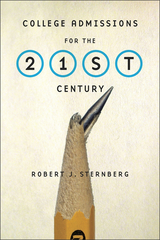
SATs, ACTs, GPAs. Everyone knows that these scores can’t tell a college everything that’s important about an applicant. But what else should admissions officers look for, and how can they know it when they see it? In College Admissions for the 21st Century a leading researcher on intelligence and creativity offers a bold and practical approach to college admissions testing.
Standardized tests are measures of memory and analytical skills. But the ever-changing global society beyond a college campus needs more than just those qualities, argues Robert Sternberg. Tomorrow’s leaders and citizens also need creativity, practicality, and wisdom.
How can the potential for those complex qualities be measured? One answer is “Kaleidoscope,” a new initiative in undergraduate admissions, first used at Tufts University. Its open-ended questions for applicants, and the means used to score the answers, gives applicants and admissions officers the chance to go beyond standardized tests.
Does it work? As Sternberg describes in detail, Kaleidoscope measures predicted first-year academic success, over and above SATs and high school GPAs, and predicted first-year extracurricular activities, leadership, and active citizenship as well. And every year that Kaleidoscope measures were used, the entering class’s average SATs and high school GPAs went up too.
What worked at Tufts can work elsewhere. New kinds of assessments, like Kaleidoscope, can liberate many colleges and students from the narrowness of standardized tests and inspire new approaches to teaching for new kinds of talented, motivated citizens of the world.
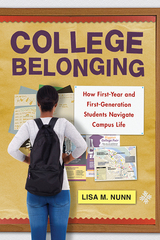
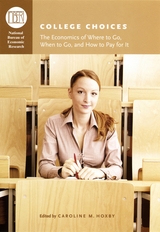
In College Choices, Caroline Hoxby and a distinguished group of economists show how students and their families really make college decisions—how they respond to financial aid options, how peer relationships figure in the decision-making process, and even whether they need mentoring to get through the admissions process. Students of all sorts are considered—from poor students, who may struggle with applications and whether to continue on to college, to high aptitude students who are offered "free rides" at elite schools. College Choices utilizes the best methods and latest data to analyze the college decision-making process, while explaining how changes in aid and admissions practices inform those decisions as well.
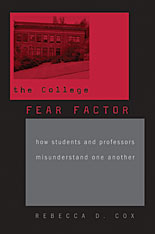
They’re not the students strolling across the bucolic liberal arts campuses where their grandfathers played football. They are first-generation college students—children of immigrants and blue-collar workers—who know that their hopes for success hinge on a degree.
But college is expensive, unfamiliar, and intimidating. Inexperienced students expect tough classes and demanding, remote faculty. They may not know what an assignment means, what a score indicates, or that a single grade is not a definitive measure of ability. And they certainly don’t feel entitled to be there. They do not presume success, and if they have a problem, they don’t expect to receive help or even a second chance.
Rebecca D. Cox draws on five years of interviews and observations at community colleges. She shows how students and their instructors misunderstand and ultimately fail one another, despite good intentions. Most memorably, she describes how easily students can feel defeated—by their real-world responsibilities and by the demands of college—and come to conclude that they just don’t belong there after all.
Eye-opening even for experienced faculty and administrators, The College Fear Factor reveals how the traditional college culture can actually pose obstacles to students’ success, and suggests strategies for effectively explaining academic expectations.

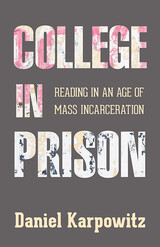
College in Prison chronicles how, since 2001, Bard College has provided hundreds of incarcerated men and women across the country access to a high-quality liberal arts education. Earning degrees in subjects ranging from Mandarin to advanced mathematics, graduates have, upon release, gone on to rewarding careers and elite graduate and professional programs. Yet this is more than just a story of exceptional individuals triumphing against the odds. It is a study in how the liberal arts can alter the landscape of some of our most important public institutions giving people from all walks of life a chance to enrich their minds and expand their opportunities.
Drawing on fifteen years of experience as a director of and teacher within the Bard Prison Initiative, Daniel Karpowitz tells the story of BPI’s development from a small pilot project to a nationwide network. At the same time, he recounts dramatic scenes from in and around college-in-prison classrooms pinpointing the contested meanings that emerge in moments of highly-charged reading, writing, and public speaking. Through examining the transformative encounter between two characteristically American institutions—the undergraduate college and the modern penitentiary—College in Prison makes a powerful case for why liberal arts education is still vital to the future of democracy in the United States.
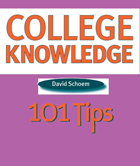
What educators and students have to say about David Schoem's College Knowledge:
"David Schoem is a devoted teacher. He recognizes the challenges of preparing to be a responsible, compassionate, successful adult in the twenty-first century. He has written a book that can make a meaningful difference in the lives of its readers."
---Jeffrey Lehman, President, Cornell University
"College Knowledge is full of wise, straight-to-the-point guidance for success both in and out of the classroom. Every first-year student should read-a--nd heed---David Schoem's advice. Though written for students, parents of first-year students can learn from it, too!"
---Beverly Daniel Tatum, President, Spelman College
"College Knowledge is a deceptively straightforward guide appropriate for any student entering higher education. As both a parent and an educator, I highly recommend this sage, yet easy-to-digest guide as a must for the college-bound young adult."
---Pamela Horne, Director of Admissions, Michigan State University
"Professor Schoem's insights and encouragement helped me to create many of my most satisfying and lasting experiences during college. This book captures his infectious enthusiasm and will inspire readers to take risks in exploring all that college has to offer."
---Miriam Vogel, former Schoem student
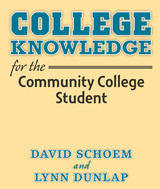
Most students arrive at college not fully aware of just how different the college experience is from other prior experiences. The intellectual and social expectations, as well as the rules and regulations, are different, and not just different from high school.
While all college students must learn to negotiate the transition to college, the challenges for those who enroll in community colleges are unique. Many community college students work, and many work full-time. Many also have family responsibilities—children, partners, and aging parents. A majority of community college students are the first in their family to enroll in college. Some students—both from abroad and from the United States--do not speak English fluently. Some students are retired military personnel. and some are seeking to make a career change. This book strives to speak to this diversity as well as to situations specific to today’s U.S. community college students.
College Knowledge for the Community College Student is a road map and tour guide for a successful community college experience and education. Tips are based on research and the wisdom and advice of other community college students and are designed to help students learn, succeed, graduate, and have a rewarding and fulfilling community college experience.

"Students and parents alike will benefit from reading David Schoem's well-written, lively, and documented guide."
---Elie Wiesel
“This is a wonderful sequel to Schoem’s very successful College Knowledge: 101 Tips. As I read through this new volume, I was constantly struck that the advice offered would help all students who approach the college experience with distinctive cultural backgrounds and commitments. Indeed all prospective college students, and their parents, can benefit from this serious yet delightful, well-written and incisive book of advice. I intend to buy one for each of my grandchildren.”
---Harold Shapiro, former president, Princeton University; former president, University of Michigan
For the individual Jewish student who enters college, it is critical that he or she come intellectually, emotionally, and spiritually prepared for the academic and social experience that awaits. College is a qualitatively different experience than high school, and students’ expectations need to be set appropriately. The transition from high school to college is so significant that it can be difficult for most without some preparation.
College Knowledgefor the Jewish Student: 101 Tips is the perfect guide for students heading off to college with high expectations for learning, academic success, personal growth, and independence. Through lively tips and compelling student stories about life at college, it offers thoughtful, practical information for every Jewish student who wants to make a successful transition.
College Knowledge for the Jewish Student includes tips on the academic aspects of college life, like communicating with faculty, learning what is where on campus, where to go for help with coursework, how to manage one’s time for a balanced experience, etc. In addition, it offers advice on dealing with family, finances, health, and safety, as well as the many social and emotional aspects of this important rite of passage.
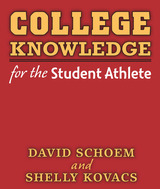
This book was written to support the academic success of student athletes—whether at a large or small university or college, whether team or individual sport, whether women or men, whether on scholarship or not.
While all college students must learn to negotiate the complex transition from high school to college, student athletes face unique challenges, including the complicated set of regulations set out by the NCAA and individual conferences that determine eligibility. The current environment in college athletics makes it even more critical that student athletes understand what they need to do academically and how to avoid potential situations that could jeopardize their athletic careers.
College Knowledge for the Student Athlete is a road map and tour guide for a successful career as a student athlete. Tips are based on research and the authors’ experience, as well as the wisdom and advice of hundreds of former student athletes.

Stressed and sleepless, today's high school students race from school to activities in their most competitive game of all: admission to a top-ranked, prestigious university. But is relying on magazine rankings and a vague sense of "prestige" really the best way to choose a college? Is hiring test prep teachers and consultants really the best way to shape your own education?
In this book, edited by a veteran admissions counselor, a passionate advocate for students, the presidents and admission deans of leading colleges and universities--like Dartmouth, Vanderbilt, Harvard--remind readers that college choice and admission are a matter of fit, not of winning a prize, and that many colleges are "good" in different ways. They call for bold changes in admissions policies and application strategies, to help both colleges and applicants to rediscover what college is really for. It's not just a ticket to financial success, but a once-in-a-lifetime chance to explore new worlds of knowledge.
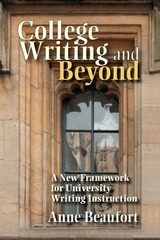
Composition research consistently demonstrates that the social context of writing determines the majority of conventions any writer must observe. Still, most universities organize the required first-year composition course as if there were an intuitive set of general writing "skills" usable across academic and work-world settings.
In College Writing and Beyond: A New Framework for University Writing Instruction, Anne Beaufort reports on a longitudinal study comparing one student’s experience in FYC, in history, in engineering, and in his post-college writing. Her data illuminate the struggle of college students to transfer what they learn about "general writing" from one context to another. Her findings suggest ultimately not that we must abolish FYC, but that we must go beyond even genre theory in reconceiving it.
Accordingly, Beaufort would argue that the FYC course should abandon its hope to teach a sort of general academic discourse, and instead should systematically teach strategies of responding to contextual elements that impinge on the writing situation. Her data urge attention to issues of learning transfer, and to developmentally sound linkages in writing instruction within and across disciplines. Beaufort advocates special attention to discourse community theory, for its power to help students perceive and understand the context of writing.

Until the suppression of the Society of Jesus in 1773 by Pope Clement XIV, the Jesuits had been the undisputed “schoolmasters of Europe.” In France, especially, the educational system of the Society had attained its most widespread development and its greatest fame. The nineteenth-century colleges, formed after the revival of the Society in 1814, never reached the number, size, or influence of their predecessors; but for their time and for the new obstacles they faced, these schools were important. Founded during a period of growing secularization, they faced the constant threat of political attack. Indeed, both their admirers and their critics believed that the Jesuit schools fostered in their graduates distinctive attitudes toward state and society.
John W. Padberg, S.J., has written the first full-length study of these colleges, from their revival in 1815 to their suppression in 1880. Drawing almost exclusively on archival material not previously utilized, Father Padberg places his study against the background of anti-clericalism, revolution, the Second Empire, and the first decade of the Third Republic. He describes the founding of the schools; their resources; their curriculum structure and content; their inner life—religious practices, the daily order, the social structure; and their relation to the political and social milieu of the times. He also discusses the backgrounds and ideological orientations of the faculty and students.
The author first portrays life in the semi-clandestine seminary schools in France from 1815 to 1828. He then depicts the experiences of the exile colleges on the borders of France. With the passage of the Falloux Law of 1850, Jesuit colleges became legal in France for the first time since the 18th century. Father Padberg describes the subsequent rush to found new schools and the resultant problems of lack of personnel, financial crises, and governmental suspicion. He discusses in detail the inner lives of these seventeen new colleges.
During the early years of the Third Republic, the Jesuits founded eleven more colleges. But the mutual fear and misunderstanding between the Society and the Republic and the growing anti-clericalism of the government came to a climax in 1880, when Jules Ferry expelled the Jesuits from these institutions and made impossible their control over any such schools in France.
Father Padberg concludes that during these sixty-five years the French Jesuit schools had little room to maneuver. Externally, government suspicion and hostility circumscribed them. Internally, they reacted to this hostility, which antedated the French Revolution, by the inability to adapt to contemporary circumstances their commitment to the values of a humane and Christian education.
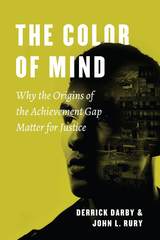
Telling the story of what they call the Color of Mind—the idea that there are racial differences in intelligence, character, and behavior—they show how philosophers, such as David Hume and Immanuel Kant, and American statesman Thomas Jefferson, contributed to the construction of this pernicious idea, how it influenced the nature of schooling and student achievement, and how voices of dissent such as Frederick Douglass, Frances Ellen Watkins Harper, and W. E. B. Du Bois debunked the Color of Mind and worked to undo its adverse impacts.
Rejecting the view that racial differences in educational achievement are a product of innate or cultural differences, Darby and Rury uncover the historical interplay between ideas about race and American schooling, to show clearly that the racial achievement gap has been socially and institutionally constructed. School leaders striving to bring justice and dignity to American schools today must work to root out the systemic manifestations of these ideas within schools, while still doing what they can to mitigate the negative effects of poverty, segregation, inequality, and other external factors that adversely affect student achievement. While we cannot expect schools alone to solve these vexing social problems, we must demand that they address the dignitary injustices associated with how we track, discipline, and deal with special education that reinforce long-standing racist ideas. That is the only way to expel the Color of Mind from schools, close the racial achievement gap, and afford all children the dignity they deserve.

"Peshkin strikes a hopeful chord, revealing what social encounters among ethnic groups—at their best—can be like in America."—Education Digest
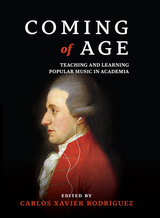
This book is a collection of essays originally presented at Ann Arbor Symposium IV, Teaching and Learning Popular Music, at the University of Michigan. Organized into four sections of similar-themed writings, the essays trace numerous discourses, principles, methods, and prospects for popular music education in academia. Additionally, the book contains several features that are useful for modern-day scholars and their institutions. First, it acknowledges the gradual liquidation of traditional disciplinary boundaries, signaling the likely future dominance of interdisciplinary research and collaborations. Second, it values international perspectives of music teaching and learning. Third, the selected topics, methodologies, and predictions provide a working agenda for the future development and success of popular music teaching and learning.
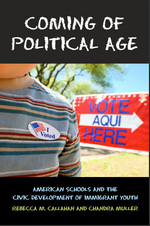

In a provocative book-length essay, Patricia Lynne argues that most programmatic assessment of student writing in U.S. public and higher education is conceived in the terms of mid-20th century positivism. Since composition as a field had found its most compatible home in constructivism, she asks, why do compositionists import a conceptual frame for assessment that is incompatible with composition theory?
By casting this as a clash of paradigms, Lynne is able to highlight the ways in which each theory can and cannot influence the shape of assessment within composition. She laments, as do many in composition, that the objectively oriented paradigm of educational assessment theory subjugates and discounts the very social constructionist principles that empower composition pedagogy. Further, Lynne criticizes recent practice for accommodating the big business of educational testing—especially for capitulating to the discourse of positivism embedded in terms like "validity" and "reliability." These terms and concepts, she argues, have little theoretical significance within composition studies, and their technical and philosophical import are downplayed by composition assessment scholars.
There is a need, Lynne says, for terms of assessment that are native to composition. To open this needed discussion within the field, she analyzes cutting-edge assessment efforts, including the work of Broad and Haswell, and she advances a set of alternate terms for evaluating assessment practices, a set of terms grounded in constructivism and composition.
Coming to Terms is ambitious and principled, and it takes a controversial stand on important issues. This strong new volume in assessment theory will be of serious interest to assessment specialists and their students, to composition theorists, and to those now mounting assessments in their own programs.
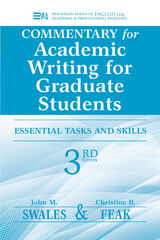
The Commentary for the third edition of this successful guide to writing has been revised and expanded in many ways to provide more support for instructors; this includes additional tasks for Units Two and Four to supplement the main text. However, the collegial tone established in previous Commentaries between Swales & Feak and instructors has been retained.
This volume contains commentaries on each of the eight units plus the two appendixes. The format for each unit includes
- a summary of the main points of the unit along with a list of topics covered.
- a synopsis of activities, divided into Language Focus sections and description of tasks.
- some general notes designed to capture the character of the unit, to indicate alternative activities, or to anticipate problems that may arise.
- detailed commentary and discussion of individual tasks, including model or sample answers where possible.
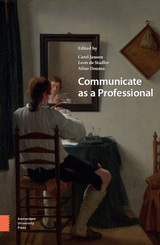
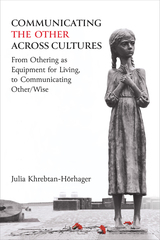
Communicating the Other across Cultures uses examples from the United States, Western Europe, and Russia to demonstrate historical patterns of Othering people, as well as how marginalized people fight back against dominant powers that seek to silence or erase them. Deeply ingrained in our society, cultural Othering affects information in history books, children’s education, and the values upheld in our society. By taking a closer look at historical and modern instances of Othering, Julia Khrebtan-Hörhager shows examples of how different societies created ideas of social and cultural superiority or inferiority, and how deeply they are ingrained in our current society. In everyday life—the cash in your pocket, the movies shown at your local theater, museum exhibits, or politician's speeches—certain cultural ideologies are consistently upheld, while others are silenced. By exposing the communicative patterns of those in power, Khrebtan-Hörhager then suggests alternative ways of thinking, communicating, and eventually being, that offer transformative solutions for global problems.
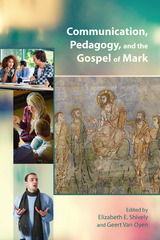
Using Mark as a test case, scholars address questions like: How should my research and my approach to the text play out in the classroom? What differences should my academic context and my students' expectations make? How should new approaches and innovations inform interpretation and teaching? This resource enables biblical studies instructors to explore various interpretative approaches and to begin to engage pedagogical issues in our changing world.
Features:
- Ideas that may be adapted for teaching any biblical text
- Diverse perspectives from nine experts in their fields
- Essays include tips, ideas, and lesson plans for the classroom
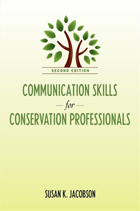

Community and public support are essential to the success of conservation and resource management programs. Often, the level of support received depends on whether or not the goals and importance of the program have been clearly explained to the public, the press, or policymakers. Without good communication, even the best programs are liable to fail.
Communication Skills for Conservation Professionals provides in-depth guidance on achieving conservation goals through better communications. It introduces communication approaches -- marketing and mass media, citizen participation, public information, environmental interpretation, and conservation education activities -- and offers scores of real-world examples and straightforward advice that will help conservationists develop the the skills they need to communicate effectively. Following an introductory chapter that provides an overview of the communication process, the book:
- describes research techniques for gathering background information and targeting audiences
- outlines the steps involved in developing a communications campaign
- explains how to use mass media-from giving interviews to writing news releases and holding press conferences
- provides examples for developing interpretive media for conservation
- explores long-term conservation education strategies
- presents program evaluation techniques to determine the level of success achieved, or to identify steps for improvement
Communication Skills for Conservation Professionals is a much-needed contribution to the environmental literature that will play a vital role in helping scientists, managers, concerned citizens, and students to more effectively communicate their knowledge and concern about the environment, and to achieve greater professional and community success with their environmental campaigns.
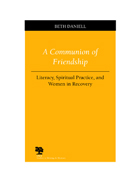
Drawing on interviews and an array of scholarly work, Beth Daniell maps out the relations of literacy and spirituality in A Communion of Friendship: Literacy, Spiritual Practice, and Women in Recovery. Daniell tells the story of a group of women in “Mountain City” who use reading and writing in their search for spiritual growth. Diverse in socioeconomic status, the Mountain City women are, or have been, married to alcoholics. In Al-Anon, they use literacy to practice the Twelve Steps of Alcoholics Anonymous in order to find spiritual solutions to their problems.
In addition, Daniell demonstrates that in the lives of these women, reading, writing, and speaking are intertwined, embedded in one another in rich and complex ways. For the women, private literate practice is of the utmost importance because it aids the development and empowerment of the self. These women engage in literate practices in order to grow spiritually and emotionally, to live more self-aware lives, to attain personal power, to find or make meaning for themselves, and to create community. By looking at the changes in the women’s reading, Daniell shows that Al-Anon doctrine, particularly its oral instruction, serves as an interpretive tool. This discussion points out the subtle but profound transformations in these women’s lives in order to call for an inclusive notion of politics.
Foregrounding the women’s voices, A Communion of Friendship addresses a number of issues important in composition studies and reading instruction. This study examines the meaning of literacy within one specific community, with implications both for pedagogy and for empirical research in composition inside and outside the academy.
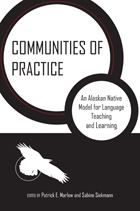
In Alaska, the Second Language Acquisition Teacher Education (SLATE) project was designed to enable Indigenous communities and schools to improve the quality of native-language and English-language instruction and assessment by focusing on the elimination of barriers that have historically hindered degree completion for Indigenous and rural teachers. The Guided Research Collaborative (GRC) model, was employed to support the development of communities of practice through near-peer mentoring and mutual scaffolding. Through this important new model, teachers of both the heritage language, in this case Central Yup’ik, and English were able to situate their professional development into a larger global context based on current notions of multilingualism.
In Communities of Practice contributors show how the SLATE program was developed and implemented, providing an important model for improving second-language instruction and assessment. Through an in-depth analysis of the program, contributors show how this project can be successfully adapted in other communities via its commitment to local control in language programming and a model based on community-driven research.
Communities of Practice demonstrates how an initial cohort of Yup’ik- and English-language teachers collaborated to negotiate and ultimately completed the SLATE program. In so doing, these educators enhanced the program and their own effectiveness as teachers through a greater understanding of language learning. It is these understandings that will ultimately allow heritage- and English-language teachers to work together to foster their students’ success in any language.
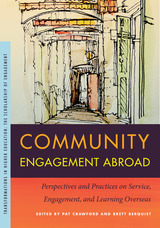
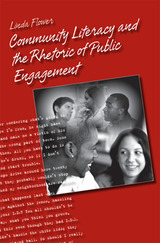
Community Literacy and the Rhetoric of Public Engagement explores the critical practice of intercultural inquiry and rhetorical problem-solving that encourages urban writers and college mentors alike to take literate action. Author Linda Flower documents an innovative experiment in community literacy, the Community Literacy Center in Pittsburgh, and posits a powerful and distinctively rhetorical model of community engagement and pedagogy for both marginalized and privileged writers and speakers. In addition, she articulates a theory of local publics and explores the transformative potential of alternative discourses and counter-public performances.
In presenting a comprehensive pedagogy for literate action, the volume offers strategies for talking and collaborating across difference, forconducting an intercultural inquiry that draws out situated knowledge and rival interpretations of shared problems, and for writing and speaking to advocate for personal and public transformation. Flower describes the competing scripts for social engagement, empowerment, public deliberation, and agency that characterize the interdisciplinary debate over models of social engagement.
Extending the Community Literacy Center’s initial vision of community literacy first published a decade ago, Community Literacy and the Rhetoric of Public Engagement makes an important contribution to theoretical conversations about the nature of the public sphere while providing practical instruction in how all people can speak publicly for values and visions of change.
Winner, 2009 Rhetoric Society of America Book Award
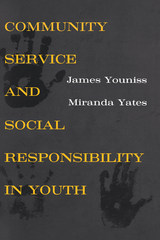
Using a case study from a predominantly Black, urban high school in Washington, D.C., Youniss and Yates build on the insights of Erik Erikson on the social and historical nature of identity development. They show that service at a soup kitchen as part of a course on social justice gives youth the opportunity to reflect on their status in society, on how society is organized, on how government should use its power, and on moral principles related to homelessness and poverty. Developing a sense of social responsibility and a civic commitment, youth come to see themselves as active agents in society.
The most authoritative work to date on the subject, this book challenges negative stereotypes of contemporary adolescents and illustrates how youth, when given the opportunity, can use their talents for social good. It will interest readers concerned with the development of today's youth and tomorrow's society.

Community-based Language Learning offers a new framework for world language educators interested in integrating community-based language learning (CBLL) into their teaching and curricula. CBLL connects academic learning objectives with experiential learning, ranging from reciprocal partnerships with the community (e.g., community engagement, service learning) to one-directional learning situations such as community service and site visits.
This resource prepares teachers to implement CBLL by offering solid theoretical frameworks alongside real-world case studies and engaging exercises, all designed to help students build both language skills and authentic relationships as they engage with world language communities in the US. Making the case that language learning can be a tool for social change as well, Community-based Language Learning serves as a valuable resource for language educators at all levels, as well as students of language teaching methodology and community organizations working with immigrant populations.
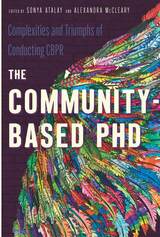
The Community-Based PhD brings together the experiences of PhD students from a range of disciplines discussing CBPR in the arts, humanities, social sciences, public health, and STEM fields. They write honestly about what worked, what didn’t, and what they learned. Essays address the impacts of extended research time frames, why specialized skill sets may be needed to develop community-driven research priorities, the value of effective relationship building with community partners, and how to understand and navigate inter- and intra-community politics.
This volume provides frameworks for approaching dilemmas that graduate student CBPR researchers face. They discuss their mistakes, document their successes, and also share painful failures and missteps, viewing them as valuable opportunities for learning and pushing the field forward. Several chapters are co-authored by community partners and provide insights from diverse community perspectives. The Community-Based PhD is essential reading for graduate students, scholars, and the faculty who mentor them in a way that truly crosses disciplinary boundaries.
Contributors: Anna S. Antoniou, Amy Argenal, Sonya Atalay, Stacey Michelle Chimimba Ault, Victoria Bochniak, Megan Butler, Elias Capello, Ashley Collier-Oxandale, Samantha Cornelius, Annie Danis, Earl Davis, John Doyle, Margaret J. Eggers, Cyndy Margarita García-Weyandt, R. Neil Greene, D. Kalani Heinz, Nicole Kaechele, Myra J. Lefthand, Emily Jean Leischner, Christopher B. Lowman, Geraldine Low-Sabado, Alexandra G. Martin, Christine Martin, Alexandra McCleary, Chelsea Meloche, Bonnie Newsom, Katherine L. Nichols, Claire Novotny, Nunanta (Iris Siwallace), Reidunn H. Nygård, Francesco Ripanti, Elena Sesma, Eric Simons, Cassie Lynn Smith, Tanupreet Suri, Emery Three Irons, Arianna Trott, Cecilia I. Vasquez, Kelly D. Wiltshire, Julie Woods, Sara L. Young
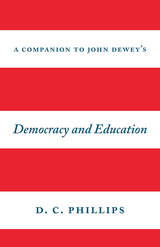
Phillips bridges several critical pitfalls of Democracy and Education that often prevent contemporary readers from fully understanding it. Where Dewey sorely needs a detailed example to illustrate a point—and the times are many—Phillips steps in, presenting cases from his own classroom experiences. Where Dewey casually refers to the works of people like Hegel, Herbart, and Locke—common knowledge, apparently, in 1916—Phillips fills in the necessary background. And where Dewey gets convoluted or is even flat-out wrong, Phillips does what few other scholars would do: he takes Dewey to task. The result is a lively accompaniment that helps us celebrate and be enriched by some of the most important ideas ever offered in education.
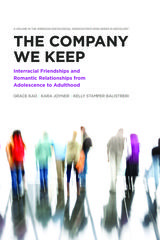
While research on interracial social ties has often focused on whites and blacks, Hispanics are the largest minority group and Asian Americans are the fastest growing racial group in the United States. The Company We Keep examines friendships and romantic relationships among blacks, whites, Hispanics, and Asian Americans to better understand the full spectrum of contemporary race relations. Using data from the National Longitudinal Study of Adolescent to Adult Health, the authors explore the social ties of more than 15,000 individuals from their first survey responses as middle and high school students in the mid-1990s through young adulthood nearly fifteen years later. They find that while approval for interracial marriages has increased and is nearly universal among young people, interracial friendships and romantic relationships remain relatively rare, especially for whites and blacks. Black women are particularly disadvantaged in forming interracial romantic relationships, while Asian men are disadvantaged in the formation of any romantic relationships, both as adolescents and as young adults. They also find that people in same-sex romantic relationships are more likely to have partners from a different racial group than are people in different-sex relationships. The authors pay close attention to how the formation of interracial friendships and romantic relationships depends on opportunities for interracial contact. They find that the number of students choosing different-race friends and romantic partners is greater in schools that are more racially diverse, indicating that school segregation has a profound impact on young people’s social ties.
Kao, Joyner, and Balistreri analyze the ways school diversity and adolescent interracial contact intersect to lay the groundwork for interracial relationships in young adulthood. The Company We Keep provides compelling insights and hope for the future of living and loving across racial divides.
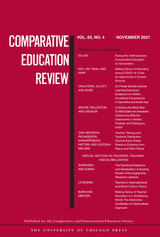
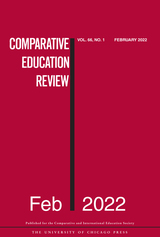
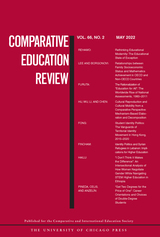
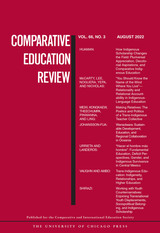
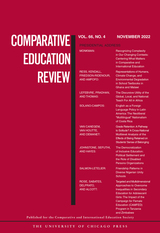
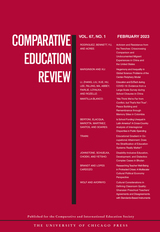
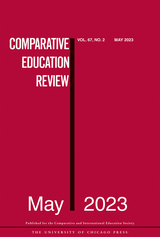
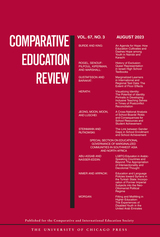
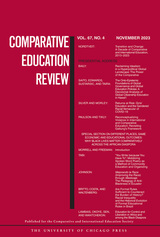
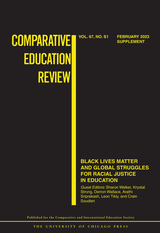

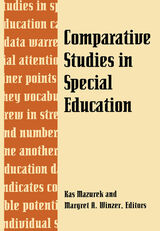
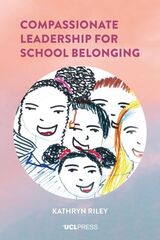
Compassionate Leadership for School Belonging draws on forty years of international research and professional practice to show how schools can be places of safety and fulfillment, even in the most difficult of circumstances. When belonging is a school’s guiding principle, more young people experience a sense of connectedness and friendship, perform better academically, and come to believe in themselves; their teachers feel more professionally fulfilled, their families more accepted. The originality of this highly readable book lies in its scope. It offers international analysis from the OECD alongside insights from the author’s extensive research in schools, powerfully supported by observational vignettes and drawings from the children, young people, and teachers who have been her co-researchers. The book reveals patterns of dislocation, disaffection, and exclusion, and highlights the points of intervention in policy and practice needed across school systems to create the conditions for school belonging. The methodologies, concepts, and research tools offered can be used by practitioners and researchers in their own contexts and to guide school leaders towards creating their own places of belonging.

Young children and even infants work hard at mastering various kills and show spontaneous pleasure at their own accomplishment. John Nicholls explores the conditions that cause students to lose their unselfconscious involvement in a game or task and become concerned with how they are stacking up against others. Charting the development of children’s concepts of luck, effort, and ability, he argues that with age they are increasingly prone to take superiority over others as the definition of success. An emphasis on interpersonal competition, which permeates Western society, exacerbates this egotistical tendency and results in diminished accomplishment and alienation from school.
To overcome these problems, Nicholls argues, we must “become as little children” for whom absorption in exploration and accomplishment come naturally, even when those around them are more competent. This ideal is unlikely to be promoted through technical approaches to education, or by the current emphasis on the role of education in economic development. Instead, Nicholls calls for a progressive approach to education. Difficult though it is to implement, this approach is most likely to increase equality of motivation for intellectual development, substantial accomplishment, satisfaction in work, and more productive relations with others. These are important ideas for anyone interested in achievement motivation, for those professionally involved in education, and for nonspecialists interested in, or worried about, how we educate our children.
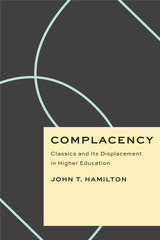
In response to philosopher Simon Blackburn’s portrayal of complacency as a vice that impairs university study at its core, John T. Hamilton examines the history of complacency in classics and its implications for our contemporary moment.
The subjects, philosophies, and literatures of ancient Greece and Rome were once treated as the foundation of learning, with everything else devolving from them. Hamilton investigates what this model of superiority, derived from the golden age of the classical tradition, shares with the current hegemony of mathematics and the natural sciences. He considers how the qualitative methods of classics relate to the quantitative positivism of big data, statistical reasoning, and presumably neutral abstraction, which often dismiss humanist subjectivity, legitimize self-sufficiency, and promote a fresh brand of academic complacency. In acknowledging the reduced status of classics in higher education today, he questions how scholarly striation and stagnation continue to bolster personal, ethical, and political complacency in our present era.


Compiled by the acknowledged leaders in environmental career information, The Complete Guide to Environmental Careers in the 21st Century is a completely revised and updated edition of what has become the standard reference on the subject. Organized for ease of use and fully updated to reflect ongoing changes in environmental fields, it is the most comprehensive and reliable resource available for anyone seeking information about environmental career opportunities and how to get started in one. The book presents: a thorough consideration of environmental trends for the 21st century and the likely impact of those trends on future career opportunities an overview of environmental professions including a statistical review of the private sector environmental industry, state and local government, federal government, academia, and nonprofits valuable tips on career search strategies along with information about education, volunteering, and internships case studies of representative work and individual profiles that give readers an up-close and personal look at a variety of environmental professionals, what they really do, and how they arrived at their current positions resources for further information including more than 100 of the top web sites for the environmental career seeke.
Chapters examine the entire spectrum of career fields, with each chapter providing an "at a glance" summary of the field; discussion of history and background along with current issues and trends; examination of specific career opportunities and the educational requirements for each; salary ranges by type of employer, level of experience, and responsibility; and an extensive list of resources for further information. Fields profiled include: planning, education and communications, energy management and conservation, fisheries and wildlife management, forestry, land and water conservation, and others.
Written at a broad introductory level, The Complete Guide to Environmental Careers in the 21st Century provides an informative and inspirational starting place from which to learn more about specific fields. For recent college graduates, students, volunteers, librarians, career counselors, or anyone interested in working to protect the environment, it is an essential reference.
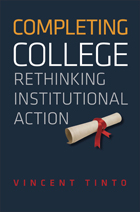
Even as the number of students attending college has more than doubled in the past forty years, it is still the case that nearly half of all college students in the United States will not complete their degree within six years. It is clear that much remains to be done toward improving student success. For more than twenty years, Vincent Tinto’s pathbreaking book Leaving College has been recognized as the definitive resource on student retention in higher education. Now, with Completing College, Tinto offers administrators a coherent framework with which to develop and implement programs to promote completion.
Deftly distilling an enormous amount of research, Tinto identifies the essential conditions enabling students to succeed and continue on within institutions. Especially during the early years, he shows that students thrive in settings that pair high expectations for success with structured academic, social, and financial support, provide frequent feedback and assessments of their performance, and promote their active involvement with other students and faculty. And while these conditions may be worked on and met at different institutional levels, Tinto points to the classroom as the center of student education and life, and therefore the primary target for institutional action.
Improving retention rates continues to be among the most widely studied fields in higher education, and Completing College carefully synthesizes the latest research and, most importantly, translates it into practical steps that administrators can take to enhance student success.
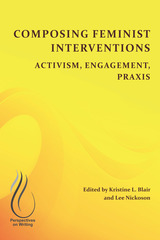
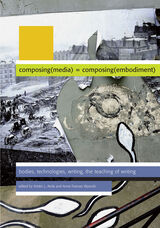
“What any body is—and is able to do—cannot be disentangled from the media we use to consume and produce texts.” ---from the Introduction.
Kristin Arola and Anne Wysocki argue that composing in new media is composing the body—is embodiment. In Composing (Media) = Composing (Embodiment), they havebrought together a powerful set of essays that agree on the need for compositionists—and their students—to engage with a wide range of new media texts. These chapters explore how texts of all varieties mediate and thereby contribute to the human experiences of communication, of self, the body, and composing. Sample assignments and activities exemplify how this exploration might proceed in the writing classroom.
Contributors here articulate ways to understand how writing enables the experience of our bodies as selves, and at the same time to see the work of (our) writing in mediating selves to make them accessible to institutional perceptions and constraints. These writers argue that what a body does, and can do, cannot be disentangled from the media we use, nor from the times and cultures and technologies with which we engage.
To the discipline of composition, this is an important discussion because it clarifies the impact/s of literacy on citizens, freedoms, and societies. To the classroom, it is important because it helps compositionists to support their students as they enact, learn, and reflect upon their own embodied and embodying writing.
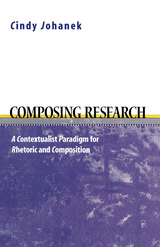
Cindy Johanek offers a new perspective on the ideological conflict between qualitative and quantitative research approaches, and the theories of knowledge that inform them. With a paradigm that is sensitive to the context of one's research questions, she argues, scholars can develop less dichotomous forms that invoke the strengths of both research traditions. Context-oriented approaches can lift the narrative from beneath the numbers in an experimental study, for example, or bring the useful clarity of numbers to an ethnographic study.
A pragmatic scholar, Johanek moves easily across the boundaries that divide the field, and argues for contextualist theory as a lens through which to view composition research. This approach brings with it a new focus, she writes. "This new focus will call us to attend to the contexts in which rhetorical issues and research issues converge, producing varied forms, many voices, and new knowledge, indeed reconstructing a discipline that will be simultaneously focused on its tasks, its knowledge-makers, and its students."
Composing Research is a work full of personal voice and professional commitment and will be a welcome addition to the research methods classroom and to the composition researcher's own bookshelf.
2000 Outstanding Scholarship Award from the International Writing Centers Association.
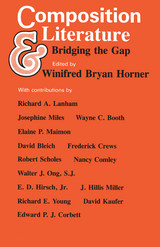
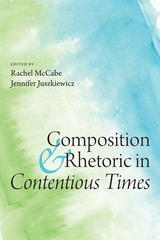
Editors Rachel McCabe and Jennifer Juszkiewicz consider how educators can respond to multiple current crises relating to composition and rhetoric with generosity and cautious optimism; in the process, they address the current concerns about the longevity of the humanities. By engaging with social constructivist, critical race, socioeconomic, and activist pedagogies, each chapter provides an answer to the question, How can our courses help students become stronger writers while contending with current social, environmental, and ethical questions posed by the world around them? The contributors consider this question from numerous perspectives, recognizing the important ways that power and privilege affect our varying means of addressing this question.
Relying on both theory and practice, Composition and Rhetoric in Contentious Times engages the future of composition and rhetoric as a discipline shaped by recent and current global events. This text appeals to early-career writing program administrators, writing center directors, and professional specialists, as well as Advanced Placement high school instructors, graduate students, and faculty teaching graduate-level pedagogy courses.
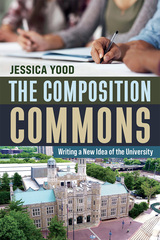
Jessica Yood traces the century-long origins of a writing-centered idea of the American university and tracks the resurgence of this idea today. Drawing on archival and classroom evidence from public colleges and universities and written in a lively autoethnographic voice, Yood names “genres of the commons”: intimate, informal writing activities that create peer-to-peer knowledge networks. She shows how these unique genres create collectivity—an academic commons—and calls on scholars to invest in composition as a course cultivating reflective, emergent, shared knowledge. Yood departs from movements that divest from the first-year composition classroom and details how an increasingly diverse student population composes complex, evolving cultural literacies that forge social bonds and forward innovation and intellectual and civic engagement.
The Composition Commons reclaims the commons as critical idea and writing classroom activities as essential practices for remaking higher education in the United States.
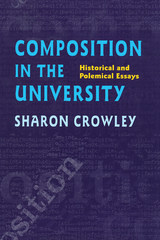
Composition in the University examines the required introductory course in composition within American colleges and universities. Crowley argues that due to its association with literary studies in English departments, composition instruction has been inappropriately influenced by humanist pedagogy and that modern humanism is not a satisfactory rationale for the study of writing. Crowley envisions possible nonhumanist rationales that could be developed for vertical curricula in writing instruction, were the universal requirement not in place.
Composition in the University examines the required introductory course in composition within American colleges and universities. According to Sharon Crowley, the required composition course has never been conceived in the way that other introductory courses have been—as an introduction to the principles and practices of a field of study. Rather it has been constructed throughout much of its history as a site from which larger educational and ideological agendas could be advanced, and such agendas have not always served the interests of students or teachers, even though they are usually touted as programs of study that students “need.”
If there is a master narrative of the history of composition, it is told in the institutional attitude that has governed administration, design, and staffing of the course from its beginnings—the attitude that the universal requirement is in place in order to construct docile academic subjects.
Crowley argues that due to its association with literary studies in English departments, composition instruction has been inappropriately influenced by humanist pedagogy and that modern humanism is not a satisfactory rationale for the study of writing. She examines historical attempts to reconfigure the required course in nonhumanist terms, such as the advent of communications studies during the 1940s. Crowley devotes two essays to this phenomenon, concentrating on the furor caused by the adoption of a communications program at the University of Iowa.
Composition in the University concludes with a pair of essays that argue against maintenance of the universal requirement. In the last of these, Crowley envisions possible nonhumanist rationales that could be developed for vertical curricula in writing instruction, were the universal requirement not in place.
Crowley presents her findings in a series of essays because she feels the history of the required composition course cannot easily be understood as a coherent narrative since understandings of the purpose of the required course have altered rapidly from decade to decade, sometimes in shockingly sudden and erratic fashion.
The essays in this book are informed by Crowley’s long career of teaching composition, administering a composition program, and training teachers of the required introductory course. The book also draw on experience she gained while working with committees formed by the Conference on College Composition and Communication toward implementation of the Wyoming Resolution, an attempt to better the working conditions of post-secondary teachers of writing.
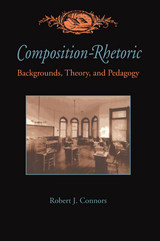
Connors provides a history of composition and its pedagogical approaches to form, genre, and correctness. He shows where many of the today’s practices and assumptions about writing come from, and he translates what our techniques and theories of teaching have said over time about our attitudes toward students, language and life.
Connors locates the beginning of a new rhetorical tradition in the mid-nineteenth century, and from there, he discusses the theoretical and pedagogical innovations of the last two centuries as the result of historical forces, social needs, and cultural shifts.
This important book proves that American composition-rhetoric is a genuine, rhetorical tradition with its own evolving theria and praxis. As such it is an essential reference for all teachers of English and students of American education.
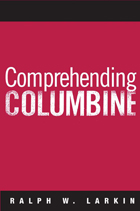
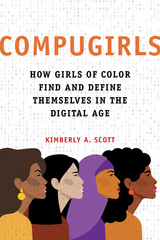
Kimberly A. Scott explores this question and others as she details the National Science Foundation-funded enrichment project COMPUGIRLS. This groundbreaking initiative teaches tech skills to adolescent girls of color but, as importantly, offers a setting that emphasizes empowerment, community advancement, and self-discovery. Scott draws on her experience as an architect of COMPUGIRLS to detail the difficulties of translating participants' lives into a digital context while tracing how the program evolved. The dramatic stories of the participants show them blending newly developed technical and communication skills in ways designed to spark effective action and bring about important change.
A compelling merger of theory and storytelling, COMPUGIRLS provides a much-needed roadmap for understanding how girls of color can find and define their selves in today's digital age.
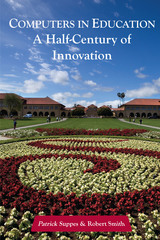
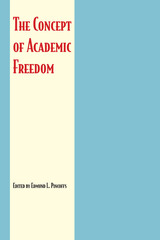
Most professors and administrators are aware that academic freedom is in danger of being brushed aside by a public that has little understanding of what is at stake. They may be only marginally aware that the defense of academic freedom is endangered by certain confusions concerning the nature of academic freedom, the criteria for its violation, and the structure of an adequate justification for claims to it. These confusions were enshrined in some of the central documents on the subject, including the 1940 Statement on Academic Freedom and Tenure, agreed upon by the American Association of University Professors and the Association of American Colleges and endorsed by many professional organizations. Careful analysis of them will not do away with debate; it will bring the debate into focus, so that attacks on academic freedom can be appraised as near or far away from the center of the target and can then be appropriately answered.
Nearly all the contemporary writing on academic freedom consists of attack or defense. The Concept of Academic Freedom is the first book to deal exclusively with fundamental conceptual issues underlying the battle. In the discussion of these issues, certain philosophical positions crystallize: radical versus liberal conceptions of the status and function of university teachers, specific versus general theories of academic freedom, consequential versus nonconsequential theories of justification. Partisans (and enemies) of academic freedom would do well to decide on which side of these divisions they stand, or how they would mediate between sides. Otherwise many questions will remain unclear: What is under discussion—a special right peculiar to academics or a general right that is especially important to academics? Is justification of that right possible? Can the right be derived from other rights, or from the theory of justice or of democratic society? Or is the argument for academic freedom one that more properly turns on the consequences for society as a whole if that freedom is not protected?
The essays in this book explore these and other problems concerning the defense of academic freedom by radicals, the justification for disruption on campus, and the control of research.
Contributors to the volume include Hugo Adam Bedau, Bertram H. Davis, Milton Fisk, Graham Hughes, Alan Pasch, Hardy E. Jones, Alexander Ritchie, Amelie Oksenberg Rorty, Rolf Sartorius, T. M. Scanlon, Richard Schmitt, John R. Searle, Judith Jarvis Thomson, and William Van Alstyne. All are outstanding in their fields. Many have had practical experience in the legal profession or with the American Association of University Professors on the issue of academic freedom.
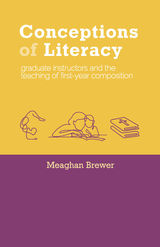
Brewer argues that conceptions of literacy undergird the work of writing instructors and that many of the anxieties around composition studies’ disciplinary status are related to the differences perceived between the field’s conceptions of literacy and those of the graduate instructors and adjuncts who teach the majority of composition courses. Conceptions of Literacy makes practical recommendations for how new graduate instructors can begin to perceive and interrogate their conceptions of literacy, which, while influential, are often too personal to recognize.
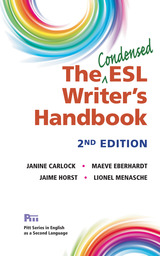
The Condensed version is concise and easily navigated; is accessible with clear and direct explanatory language; and limits its focus to the grammatical and style aspects of writing and reference material.
The 2nd Edition of The Condensed ESL Writer’s Handbook has been revised to better align with the exercises in Workbook for The ESL Writer’s Handbook, 2nd Ed.(978-0-472-03726-1). It also features an expanded Section 1 (to include more on pre-writing, drafting, revising, and editing), updated exercise items, and completely revised APA and MLA style guides (featuring MLA, 8th Edition). Overall, this handbook has these special features:
- The topic selection is based on ESL writers’ needs as observed by the authors over many years.
- The coverage of topics is more complete than the limited amount usually provided for ESL writers in first language or L1 handbooks.
- The explanatory language is appropriate for ESL students, in contrast to the more complex and idiomatic language of other English handbooks.
- Many of the text examples and exercise sentences were written by ESL students to help users realize that they too can become effective writers.

A collection of essays that provides advice and strategies for BIPOC scholars on how to survive, thrive, and resist in academic institutions.
Conditionally Accepted builds upon an eponymous blog on InsideHigherEd.com, which is now a decade-old national platform for BIPOC academics in the United States. Bringing together perspectives from academics of color on navigating intersecting forms of injustice in the academy, each chapter offers situated knowledge about experiencing—and resisting—marginalization in academia. Contextualized within existing scholarship, these personal narratives speak to institutional betrayals while highlighting agency and sharing stories of surviving on treacherous terrain. Covering topics from professional development to the emptiness of diversity, equity, and inclusion efforts, and redefining what it means to be an academic in our contemporary moment, this edited collection directly confronts issues of systemic exclusion, discrimination, harassment, microaggressions, tokenism, and surveillance. Letting marginalized scholars know they are not alone, Conditionally Accepted offers concrete wisdom for readers seeking to navigate and transform oppressive academic institutions.
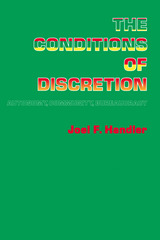

Finalist, 2022 Goody Business Book Awards, Entrepreneur, Start Ups / New Business Category
With more than fifty years of professional experience, Mark C. Zweig has seen it all—from the fear and excitement of starting a new business to the joys and challenges of life as an entrepreneur. In Confessions of an Entrepreneur: Simple Wisdom for Starting, Building, and Running a Business, Zweig draws upon this wealth of experience to offer practical, easy-to-understand guidance for bringing a business to life and cultivating success at every stage of its development. The candid stories he shares from his career provide insight into the realities of business ownership and illustrate proven principles for both personal and professional success. Written by an entrepreneur for entrepreneurs, this book is an indispensable guide filled with wisdom for new and seasoned business leaders alike.
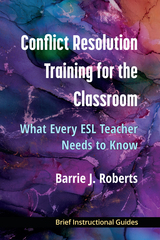
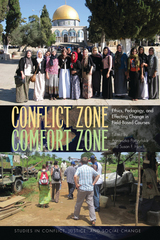
By taking students out of their comfort zone, field-based courses—which are increasingly popular in secondary and postsecondary education—have the potential to be deep, transformative learning experiences. But what happens when the field in question is a site of active or recent conflict? In Conflict Zone, Comfort Zone, editors Agnieszka Paczyńska and Susan F. Hirsch highlight new approaches to field-based learning in conflict zones worldwide. As the contributors demonstrate, instructors must leave the comfort zone of traditional pedagogy to meet the challenges of field-based education.
Drawing on case studies in the United States and abroad, the contributors address the ethical considerations of learning in conflict zones, evaluate the effectiveness of various approaches to teaching these courses, and provide guidelines for effecting change. They also explore how the challenges of field-based classes are magnified in conflict and postconflict settings, and outline the dilemmas faced by those seeking to resolve those challenges. Finally, filling a crucial gap in existing literature, the contributors identify best practices that will assist aspiring instructors in developing successful field-based courses in conflict zones.
Contributors: Daniel R. Brunstetter, Alison Castel, Gina M. Cerasani, Alexander Cromwell, Maryam Z. Deloffre, Sandi DiMola, Leslie Dwyer, Eric Hartman, Pushpa Iyer, Allyson M. Lowe, Patricia A. Maulden, rj nickels, Anthony C. Ogden, Jennifer M. Ramos, Lisa E. Shaw, Daniel Wehrenfennig
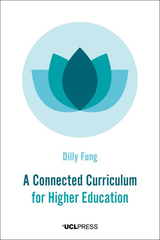
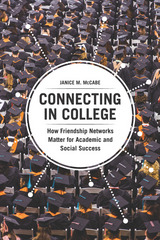
As McCabe and the students she talks to show, the friendships we forge in college are deeply meaningful, more meaningful than we often give them credit for. They can also vary widely. Some students have only one tight-knit group, others move between several, and still others seem to meet someone new every day. Some students separate their social and academic lives, while others rely on friendships to help them do better in their coursework. McCabe explores how these dynamics lead to different outcomes and how they both influence and are influenced by larger factors such as social and racial inequality. She then looks toward the future and how college friendships affect early adulthood, ultimately drawing her findings into a set of concrete solutions to improve student experiences and better guarantee success in college and beyond.
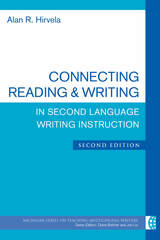
The new edition features two new chapters. The first is a chapter on assessment because students are now being asked to connect reading and writing in the classroom and on formal assessments like the TOEFL®. The second new chapter is an argument for accounting for transfer elements in the teaching and researching of reading-writing connections.
The goals of this revised volume are to provide: resources for those wishing to pursue reading-writing connections, summaries of the beliefs underlying those connections, ideas for teaching the connections in the classroom, and information about the work others have done to develop this domain of L2 writing.
READERS
Browse our collection.
PUBLISHERS
See BiblioVault's publisher services.
STUDENT SERVICES
Files for college accessibility offices.
UChicago Accessibility Resources
home | accessibility | search | about | contact us
BiblioVault ® 2001 - 2024
The University of Chicago Press






